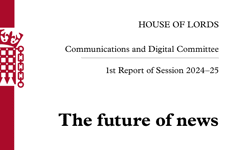As reported by the National Union of Journalists: A motion calling for action to highlight the crisis in local and regional newspaper was passed unanimously at Delegate Meeting; the dates are to be decided. The campaign week will co-ordinate debates in national parliaments and devolved assemblies.
A further motion noted that the take-over of Local World by Trinity Mirror gave it 30 per cent of the market, "having a serious effect on media plurality and a threat to journalists' jobs". The national executive was instructed to build on cross-party support from members of the London Assembly during last year's strike at Newsquest's south London titles and to "redouble efforts to get the UK government to conduct a short, sharp inquiry into the state of the regional newspaper industry".
Cross-party support for the inquiry came during an event in Parliament to launch a report, Monopolising local news: Is there an emerging local democratic deficit in the UK due to the decline of local newspapers? by Gordon Ramsay and Martin Moore, of the Centre for the Study of Media, Communication and Power, King's College London.
The panel of peers and MPs, including Tory peer and former Cabinet member Lord Fowler, Labour peer and journalist Lord Lipsey and Labour MP for Exeter and former Secretary of State for Culture, Media and Sport, backed the need for the inquiry called for by Michelle Stanistreet, NUJ general secretary.
As most of the UK country prepares for parliamentary, local elections and elections for a police commissioner, the report presented an alarming picture of the lack of choice for readers in local news provison and evidence that there is "less on-the-ground independent reporting of local public affairs, less accountability journalism (eg local investigations) and fewer local civic campaigns".
Justin Schlosberg, a lecturer in journalism and media at Birkbeck, University of London, said research he had carried out on the coverage of the London mayor contest by the Evening Standard, the capital's only newspaper, showed political bias.
Key findings of the report were:
* four publishers account for almost two-thirds (73 per cent) of local newspaper titles across the UK (Trinity Mirror, Johnston Press, Newsquest and Tindle);
* more than two-thirds of Local Authority Districts (LADs) and over half of Parliamentary constituencies (330 of 650) are not served by a dedicated daily local newspaper;
* in 165 of 380 (LADs) in England, Scotland and Wales (43 per cent) a single commercial publisher has a monopoly of print circulation and in 69 per cent of LADs a single publisher controls more than 70 per cent of newspaper circulation;
* government subsidies given to local media, which run to hundreds of millions of pounds, are not spent on promoting innovation or plurality, or on addressing the democratic deficit;
* three of the four main local news groups have reported significant reductions in staff over the past five years.
Michelle Stanistreet said people do care about having a strong local press.When Trinity Mirror decided to close its office in Caernarfon, more than a 100 residents joined an NUJ demonstration in the town's high street and when journalists on Newsquest's titles in south London went to strike over redundancies and poor pay, there was widespread, cross-party support for their action.
She said the main newspaper groups were in denial about the democratic deficit and the danger of putting so many local newspapers into the hands of so few proprietors; Simon Fox, chief executive of Trinity Mirror, which is by far the biggest publisher of local newspapers and websites, is on record saying he doesn't believe there is a problem.
She said many of the publishers are making a profit, but continue to cut staff and budgets. She noted a table in the report which showed that at Johnston Press editorial and photographic staff levels had decreased by 40 per cent, while the company's profit margin remained high and rose in 2014 to 20 per cent of revenue.
The general secretary said she agreed with the report's contention that the existing plurality framework neither promotes nor protects plurality of news media ownership across the UK and that the government should consider a major upheaval of the existing media plurality framework.
An inquiry would need to address this issue as well as looking at ideas such as an economic stimulus plan which would match subsidies to clearly-defined public purposes, the case for business rates relief linked to ensuring a local presence of newspapers in their communities and reform of legislation to allow newspapers to be classified as community assets, allowing local groups to bid for a paper due for closure.
The meeting suggested there was also the need for more research on the role of hyperlocal newspapers.
Dominic Ponsford, editor of the Press Gazette, said he reckoned there are half the number of journalists than there were in 2006, however Keith Perch, senior lecturer in journalism at the University of Derbyshire and former editor of newspapers including the South Wales Echo, Derby Telegraph and Leicester Mercury, said his research, which analysed staff lists, suggested the reduction was more like 80 per cent.












